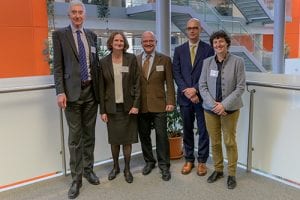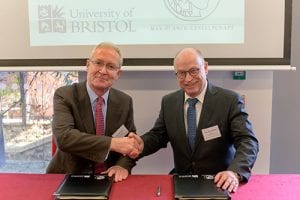Building stripped-down versions of life using protocells, genome delivery systems and synthetic cytoskeletons comprise some of the groundbreaking research due to take place at a new Centre launched at the University of Bristol on Wednesday 27 March. The Max Planck-Bristol Centre for Minimal Biology, a partnership between the University of Bristol and the Max Planck Society for the Advancement of Science (MPG) in Germany, aims to advance the future of health and medicine by understanding the fundamental nature of life.
Minimal biology is a new emerging field at the interface between the physical and life sciences. It aims to design and build artificial cells, minimal genomes, virus-like nanodevices and new cellular scaffolds, and seeks to understand the foundations of life and how it arose from non-living matter.
Led by Bristol Professors Imre Berger (Biochemistry), Stephen Mann (Chemistry) and Dek Woolfson (Chemistry and Biochemistry), and Professors Joachim Spatz (Heidelberg), Tanja Weil (Mainz) and Petra Schwille (Munich) at Max Planck Institutes in Germany, the Centre will be based in the School of Chemistry at the University of Bristol. A paramount objective is to train early career scientists in minimal biology and biodesign.

Image credit: ©Kate Kirkby
The partnership was solemnised by the signing of contracts by Professor Hugh Brady, Vice-Chancellor and President of the University of Bristol, and Professor Martin Stratmann, President of the Max Planck Society, at an inauguration event attended by around 100 delegates.

Image credit: ©Kate Kirkby

